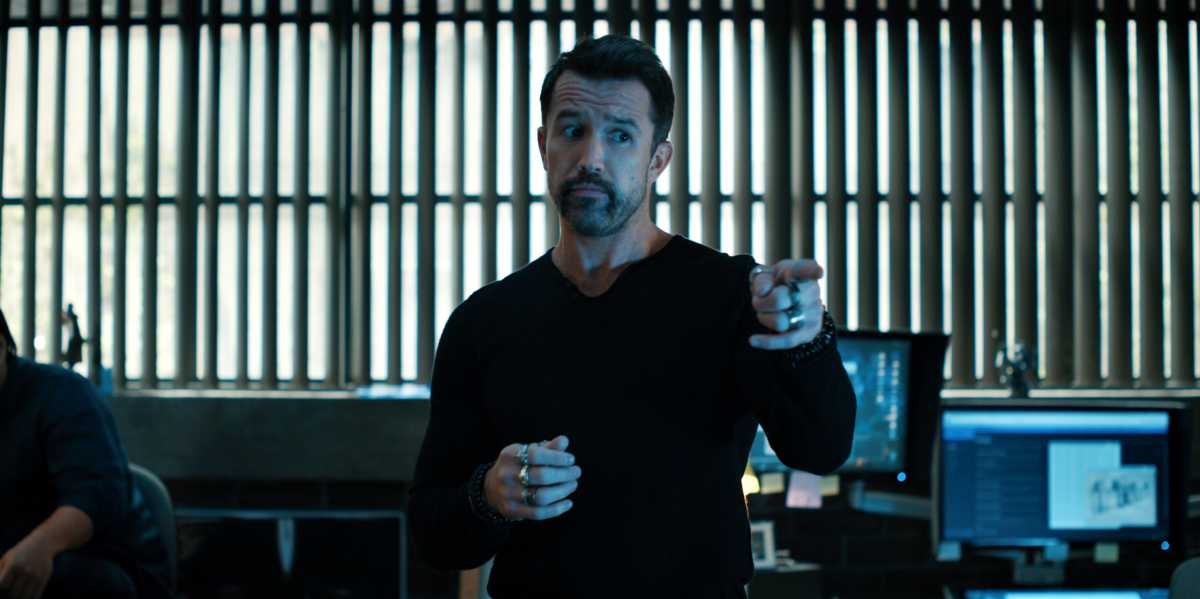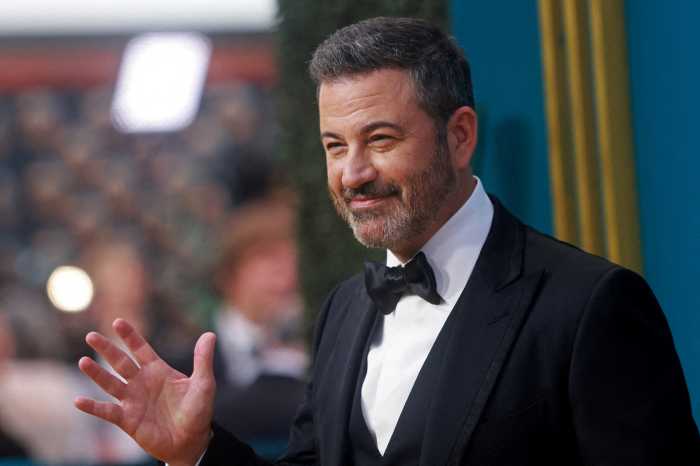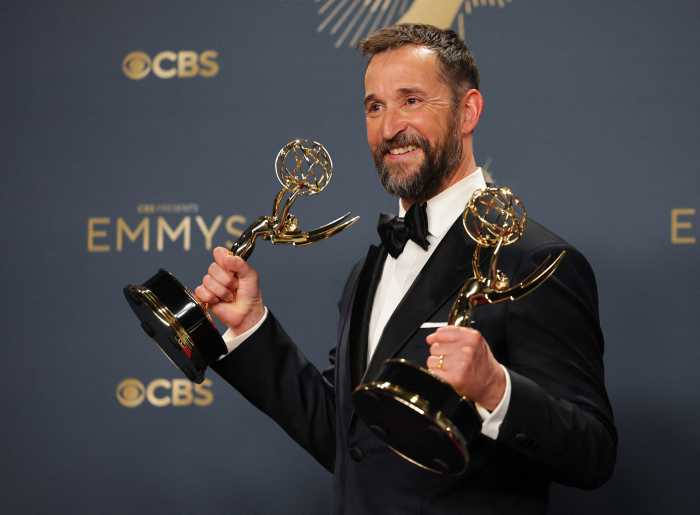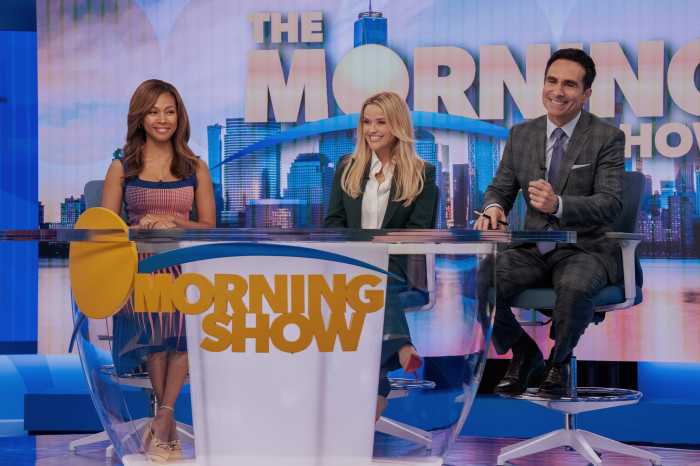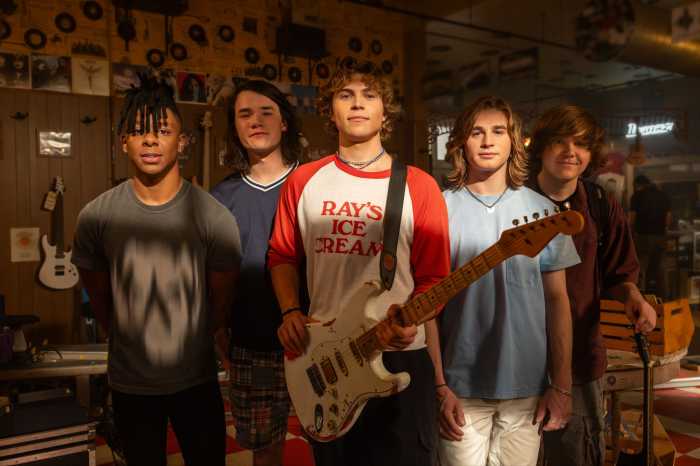Many audiences have seen Philadelphian Rob McElhenney as Mac, one of five players who make up “the gang” on FX’s ‘It’s Always Sunny in Philadelphia,’ which starts working on its 15th season soon. Most recently, however, fans have seen McElhenney’s Ian from his Apple TV+ show ‘Mythic Quest’ (with the first season titled ‘Raven’s Banquet’ and season 2 revealed to be ‘Titans Rift’) in a standalone quarantine episode that debuted last year, but also another standalone episode focusing on people getting back to work in an office post COVID.
The episodes have served as a pop-culture interpretation from the creators meant to poke a little fun, and bring comfort to those of us at home…But now season 2 of ‘Mythic Quest’ is back, and the crew of head-strong and colorful video game creators are back at it again, butting heads and bringing the laughs.
McElhenney sat down to chat all about what went into making those standalone episodes and season 2, and how ‘Mythic Quest’ has allowed him to exercise different creative muscles, especially through his character.
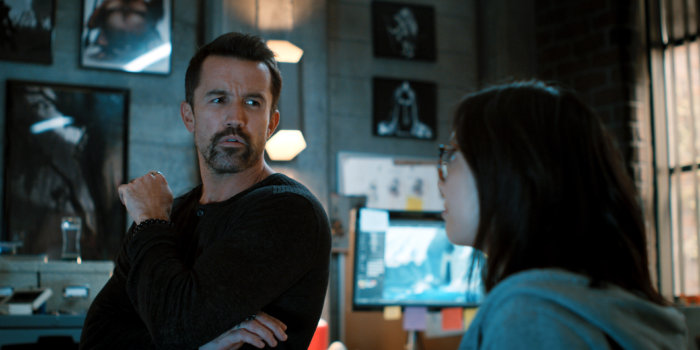
Where did the idea for your standalone episodes come from?
With the first Quarantine episode, it was really just a question of getting everybody to work. Everybody in the industry—or in every industry I should say, but certainly in entertainment—was out of work for two and a half or three months. I was talking to Megan Ganz and David Hornsby and knocking around the idea of possibly shooting an episode, much like we’re shooting right now [over Zoom] and if we could do it up to the quality and standard that we had already set from season 1. We started knocking around a couple of ideas and recognized that everybody had this shared communal experience and everybody that was working from home was doing it in a very similar way, and maybe we could capture that moment in time and certainly take a look at some of the comedic aspects of it, but also, look at some of the pathos of it and what people were struggling with. So, that was an episode that was really well received, it was very difficult to make but so rewarding and super fun.
Then, as we were talking about coming back for the second season, we wanted to put the entire pandemic behind us, because we just felt like when people are watching television in May or June and then in the future, are they going to want to talk about social distancing, quarantines and seeing masks all day long? Our take was that the answer was no—I think that people are going to want to escape from this, and not pretend like it didn’t happen but feel like we’re moving on to a more optimistic future. That’s why we felt like we would be remiss if we didn’t at least acknowledge the fact that there would have to be a transition period between where we are now and where we will be six months or a year from now hopefully. We felt like we had to honor the transition to normalcy, that’s going to be really difficult for people, whether it’s practical or just from an emotional standpoint, we had to be respectful of that and try to make it an authentic experience. That closed the door on COVID, and now we can move on to brighter skies.
So, the standalone episodes you would say are unique to the global pandemic situation?
Well, later on in the season we do another stand-alone episode that takes place in 1972, so really what we’ve been trying to do with the show from the beginning, and certainly in the second season, is to kind of mess around with the forum of what what a sitcom is traditionally—and we are by no means the first people to do that. Looking at so many great shows who have inspired us over the last few years, we go, oh wow they are blowing the rules up…There are no more rules. Let’s just figure out a way to tell cohesive, interesting, funny stories in an allotment of time under 35 minutes and call it a show. We’ll put that up there and see if people are into it.
Has the pandemic changed the way you view comedy or write it, or has it maybe changed how audiences receive it?
I certainly think it’s going to change the way—at least in the short-term, I don’t know if this is going to extend in the long term…But there’s going to be a positive that is going to come out of this. We’re going to have a little bit more admiration, respect and gratitude for what we have. At work in our communal spaces, out at restaurants—just being able to function normally with our family members, having a little bit more of an understanding of how tenuous that is and how it could go away very quickly. Maybe we can all come out of this a little bit more empathetic and compassionate then we were before we went in.
What would you tell fans to expect for season 2?
We try to mix it up a little bit, but the central relationship is Ian and Poppy. What we really try to explore there is what it’s like when you have two partners, two equals, where they both have very strong opinions on how something should go and yet neither one of them is in charge, so they have to compromise.
To me, it’s an interesting dynamic in an office setting — it is also an interesting dynamic in a nation. For us, it’s fun to get into the allegory of what is it like when a person feels really strongly about what they believe in and another person does the same and yet they have to live together, they have to work together—how do they navigate that if neither one of them is willing to compromise? That’s an idea that we are constantly exploring in the show.
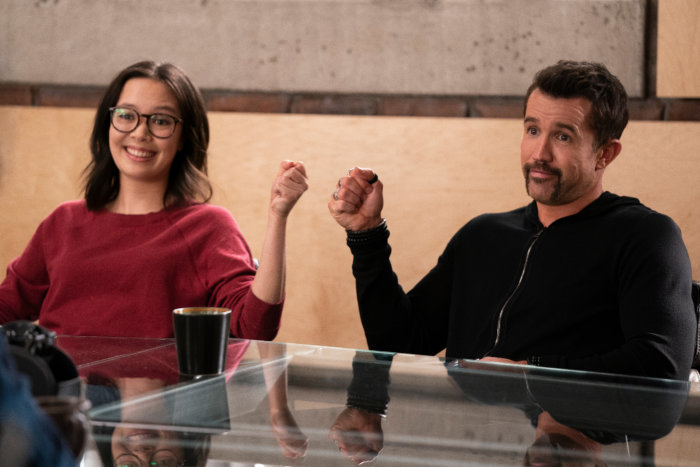
For Ian, what do you like about him? Do you feel like you’ve seen some growth in his character over the course of his seasons?
Certainly. Unlike ‘Sunny,’ where the character will never grow or learn anything ever, it’s fun to play an actual human being instead of a cartoon character…That’s part of the fun of ‘Sunny’ though, is that they’ll never learn anything and everybody knows that and they’re always the butt of the jokes and that’s why we are able to satirize what we’re able to satirize, because we’re not glamorizing anything—the behavior is abhorrent, we call it abhorrent, and that’s what the entire series is about.
Whereas with a show like this, I think we’re presenting people who are a little bit closer to real human beings. We recognize that they have incredible foibles: They’re very self-centered, they’re very ego-driven, however they’re also really good at what they do. They create something that’s very special for other people. They can be compassionate, they can be empathetic, they also can be difficult, they can be selfish and I think that’s a lot of fun to play because it’s just a lot more dimension than maybe my character Mac who’s…extensively a cartoon. I still believe there is room for satire, and that’s what ‘Sunny’ is, it feels like there’s a place for ‘Sunny’ I hope for a very long time. A show like ‘Mythic Quest’ though allows me to do something a little bit different and stretch into areas that I wouldn’t necessarily have considered when I was 26.
‘Mythic Quest’ Season 2 drops on Apple TV+ May 7.



